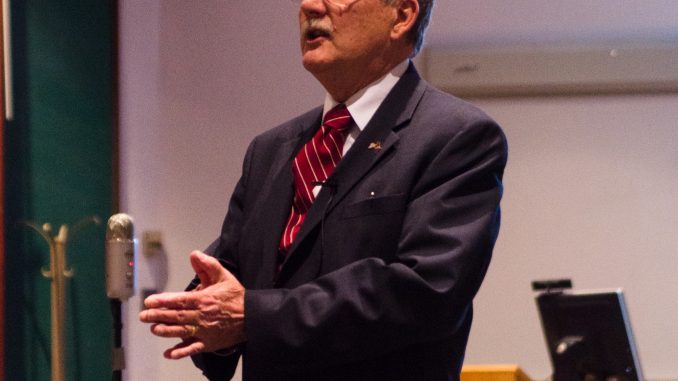
Temple’s Faculty Senate held its second meeting of the semester on Friday, where members discussed the budget, the university’s emergency management program and immigration.
President Richard Englert attended the meeting to talk about Pennsylvania’s appropriation, which contributes approximately $150 million to Temple, which makes up about 12 to 13 percent of the university’s budget. Without this funding, the university may have to fill a gap in its budget, perhaps by increasing tuition costs, said Faculty Senate President Michael Sachs.
Gov. Tom Wolf’s budget proposal recommended that Temple’s appropriation stay flat, meaning the state’s contribution to the budget will neither increase nor decrease from last year. Englert will travel to Harrisburg on Wednesday to testify before the Senate Appropriations Committee and ask more funding.

Englert also said Temple’s decentralized budget model will be reviewed over the course of the semester with the help of “sources outside the university.” The current system allows schools and colleges to collect and allocate their students’ tuition revenue, instead of the central administration. Englert said he hopes the review will provide a “fair look at some of the challenges” schools face under this model. He added that this would help define how schools were affected differently by the decentralized system.
Sarah Powell, the director of emergency management, presented the features of Temple’s emergency management program, which are procedures put in place to help faculty and students respond to emergencies on Main Campus like an active shooter situation. She said by June 30, Temple will have emergency management teams stationed in every building on Main Campus. These teams will be trained to help execute safety procedures in the event of a lockdown, shelter-in-place or active shooter scenario.
A shelter-in-place drill will occur on campus on April 6, which will then become an annual university-wide drill on all campuses, Powell said. She added that in a shelter-in-place procedure, people are expected to seek indoor shelter that is away from windows in order to avoid harmful environmental conditions like biohazard spills.
“The main goal of the upcoming shelter-in-place drill is to raise awareness about that necessary action so that if our community receives a TU Alert to shelter in place, they can react quickly and are clear about what to do,” Powell said.
“I don’t know how much [emergency response] information is shared with the students, and hopefully we can make students aware of what measures have been taken to feel as safe as possible,” Sachs said.
Faculty members also voiced their concerns about President Donald Trump’s immigration policies. When Englert was asked what he would do if government officials asked him for the names of undocumented students, he said it is “hard to answer hypotheticals.”
“We are a public university,” Englert said. “As a public university, I have certain responsibilities as concerned to laws and the state.”
Englert added that he could not share his political views, but recognized international students’ contributions to the university and Temple’s commitment to diversity.
The Faculty Senate presented a statement prepared by the Faculty Senate’s Committee for International Programs at the end of the meeting that calls for Temple leaders to stand up to any threats to diversity.
“Temple University should be vigilant to any threat to diversity, since such threats weaken our ability to fulfill our mission and are ultimately divisive,” the statement reads.
The statement also urges Temple’s administration to recognize the impact of recent national actions on the university community and speak out against Trump’s executive order.
“I hope [Englert] recognizes we are not dealing with hypothetical situations, that we are actually dealing with bills in front of our legislators at the moment,” said Eric Borguet, a chemistry professor and member of the Committee for International Programs.
“I think we should be in a proactive rather than reactive mode,” he added.
The Faculty Senate voted unanimously to send the motion to Englert and Provost JoAnne Epps.
Laura Smythe can be reached at laura.smythe@temple.edu.


Be the first to comment